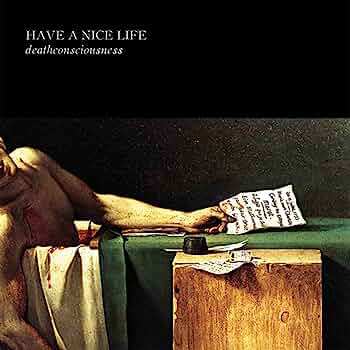Engagement editor Audrey Hogan reflects on an album she used to listen to in high school.
Replay: Have A Nice Life’s ‘Deathconsciousness’

Only a select few songs trigger a deeply primal, all-consuming sadness in me with just the opening notes.
Shoegaze and post-punk fusion duo Have a Nice Life’s “The Big Gloom” is one of them.
“Deathconsciousness,” the album “The Big Gloom” is featured on, defined a strange and upsetting period of my life, one I felt conflicted revisiting. I don’t often find myself wanting to return to those gloomy days and hours spent lost deep in an emotional sludge.
Marked by sounds of the sonically layered and guitar-based shoegaze and more dark, gothic-inspired instrumentals, Have a Nice Life’s first and most well-known album “Deathconsciousness” encapsulates a deeply depressed state. It’s a feat of low-budget recording and post-anything instrumentals, from post-punk to post-rock.
The 2008 release has since become a slightly more mainstream fan-favorite, attracting attention in TikTok music circles — which, transparently, is where I found out about it.
The first track “A Quick One Before the Eternal Worm Devours Connecticut” remains a personal favorite. A departure from the rest of the album’s brash and occasionally abrasive instrumentation, the song is comparatively stripped down.
Without lyrics, an acoustic guitar slowly dances over the ambient background track before ending with an echoey clip of someone muttering “I just don’t know” repeatedly, creating a beautiful but unsettling sonic experience.
“Bloodhail” is one of the more popular songs on the album. The loud, layered sound of “Deathconsciousness” shows itself in full force.
“And our clothes are all too often ripped / And our teeth are all too often gnashed,” the duo sings in the second verse. This is a direct reference to a lecture from Antiochus, included in a booklet alongside the album.
“Hunter” is about a man who climbs to the top of a tower made of people in order to shoot down God with arrows. The character of the Hunter is used throughout the album. “Bloodhail,” however, is told from the perspective of God once he’s been struck down.
Admittedly, I was not listening to any of the lyrics while in the depths of my high school senior year “Deathconsciousness” era. During the period when I was listening to the most Have a Nice Life, I wasn’t truly investigating the deeper meaning of these songs, largely to my detriment.
Or possibly to my benefit — to understand that the songs I was using largely as background noise to a larger depressive state might’ve caused a more upsetting spiral.
Following “Hunter” is another instrumental track, “Telephony.” Sonically harsher than “A Quick One Before the Eternal Worm Devours Connecticut,” the song is driven by a high-pitched, metallic and persistent snare drum. The drum is accompanied by the deep strumming of an electric guitar, present throughout.
Beyond Antiochus, the album also contains multiple references and allusions to religious figures, principally Jesus.
“There is No More Food” is a favorite off the album and arguably one of my favorite songs ever.
The track is beautiful, despite its haunting, depressive tone. Marked by an ambient drone and distant beeps, the song feels deliberately void of feeling. The song transports the listener beyond the world they inhabit and into the desolate landscape the song creates.
Following “There is No More Food” is the ecologically-inspired and deeply critical “Waiting for Black Metal Records to Come in the Mail.” Meant to critique corporate greed and the exploitation of people by governmental institutions, the song takes clear inspiration from the instrumentation of more punk and rock-oriented groups.
Another philosophically-driven track, “Holy Fucking Shit: 40,000” dives into the idea of determinism — a belief that life is pre-destined against free-will — through an extended “Terminator” metaphor.
“The Future” plods along after, grinding through a slow and depressingly bleak synth melody atop whispering guitars and faint organ notes. It blends into the following song “Deep, Deep,” a retrospective on evolving notions of sex and the idea that as long as humankind continues to expand, death and destruction will never stop.
The penultimate song “I Don’t Love” is less encased in metaphor than the other songs on the album. The track is a direct plea for an end to suffering and emptiness, layering an echoed refrain of “I don’t want to live like this anymore / I don’t want to live at all,” over a wall of guitar strumming.
The final song “Earthmover” continues to be a favorite of mine off the album. The song is an 11-minute effort in poignant songwriting and stunning instrumentation, broken up by a guitar-driven bass-drop halfway through the song.
Re-listening to the album was a revisit of memories lost deep in the crevices of my mind. At once, I could remember their melodies and verses. It felt like receiving an uncomfortable hug from a malicious former friend.
If the songs blended together in my mind, so did the days I spent lost in the embrace of “Deathconsciousness.”
But, I still love this album. It’s a feat of beautifully composed, emotional songwriting. It’s a raw artistic endeavor — but I wasn’t happy when I was listening to it. I woke up every morning and played songs with names like “I Don’t Love” and “There Is No More Food,” then wondered why I felt so bad all the time. Yet, there is nothing wrong with making existential, fundamentally sad music.
I am, however, proud to announce that “Deathconsciousness” is now a foreign sound and feeling to me.
“Deathconsciousness” is available on all major streaming platforms.
Featured image courtesy of Flenser Records.










